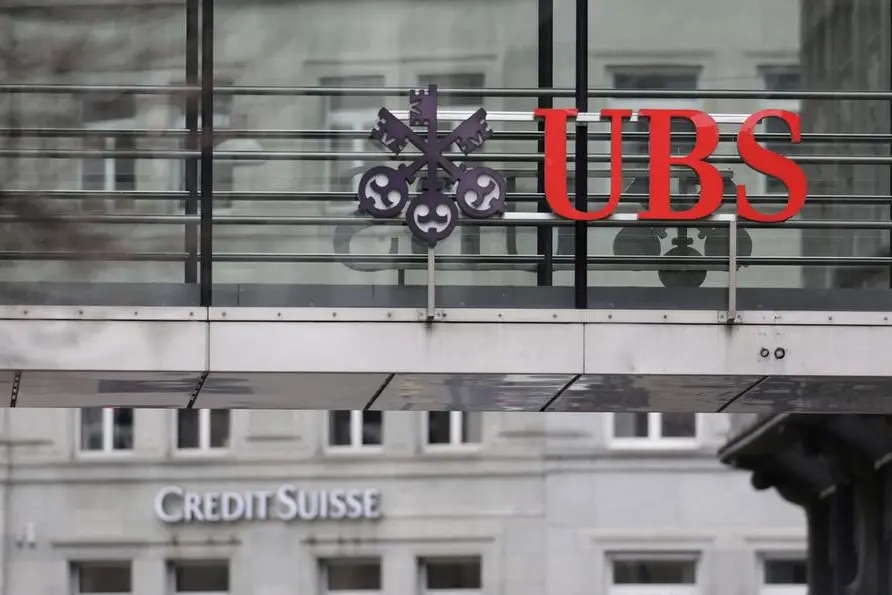PHOTO
LONDON - UBS Group emerged as Switzerland’s one and only global bank with a state-backed rescue of its smaller peer Credit Suisse, a risky bet that makes the Swiss economy more dependent on a single lender.
The unprecedented move announced late on Sunday in Zurich capped a race against time by regulators to avert a meltdown in global markets. Switzerland is pledging more than 160 billion francs ($173 billion) in loans and guarantees to underpin the new group, guarding against further risks undermining the lender.
The transaction – the first rescue of a global bank since the financial crisis of 2008 – grants enormous clout to UBS, ridding it of its main rival. It will change the landscape of banking in Switzerland, where branches of Credit Suisse and UBS are dotted everywhere, sometimes just metres apart.
The two lenders have been pillars of global finance for decades. The banks, two of the most systemically relevant in global finance, hold combined assets of up to 140% of Swiss gross domestic product in a country heavily dependent on finance for its economy.
Following the 2008 financial crash, politicians pledged to never bail out banks again. The Credit Suisse rescue, orchestrated with public money, shows banks' continued vulnerability and how their problems can quickly rebound on their home country.
But it also removes a competitor to Wall Street, with UBS planning to pare back much of Credit Suisse’s investment bank.
"Under normal circumstances, I would say it is an absolutely fantastic deal for UBS," said Johann Scholtz, equity analyst at Morningstar, covering European Banks, Amsterdam. "In the current environment, it is a bit more complicated as there is a lot of uncertainty generally in the markets."
REVERSAL OF FORTUNES
Soon after the announcement, central banks including the Federal Reserve, the European Central Bank and the Bank of Japan said they would enhance dollar swap lines, helping calm investors rattled by turmoil in the banking sector. The failure of two U.S. banks and a rout in Credit Suisse shares have sent shock waves through markets over the past week.
UBS will pay $3.2 billion for 167-year-old Credit Suisse and assume at least $5.4 billion in losses from unwinding its portfolio of derivatives and other risky assets. Credit Suisse had a market value of about $8 billion at the close on Friday.
Holders of Credit Suisse’s Additional Tier 1 bonds will get wiped out and in a controversial move will come secondary to equity holders who will receive at least some UBS shares.
It marks a radical twist of fate for the banks. During the great financial crash, it was UBS and not Credit Suisse that needed state support.
The banks' fortunes have diverged sharply over the past year. UBS earned $7.6 billion in profit in 2022, while Credit Suisse lost $7.9 billion. Credit Suisse's shares were down 74% from a year ago, while UBS's are relatively flat.
UBS becomes the undisputed global leader in managing money for the wealthy, with UBS’s leading position in China now complemented by Credit Suisse’s strength in the rest of Asia, the fastest growing region. UBS also gets to keep the jewel in Credit Suisse’s crown, the domestic bank.
"In the past, when a deal between Credit Suisse and UBS was discussed, a sticking point would be concentration, especially in the domestic market," said Morningstar’s Scholtz. "It is also the most stable part of the business, that generates quite a lot of cash. If UBS is not required to do an IPO of it, it could make sense for them to keep it, there are lots of synergies."
UBS is also taking out a big competitor in securities trading. UBS earned $7.1 billion in revenue from buying and selling stocks, currencies and bonds. Credit Suisse posted about$3.2 billion last year.
STILL SWISS
Credit Suisse's demise has been a blow to Switzerland's reputation for banking and sent shockwaves through global finance.
At a press conference announcing the deal, finance minister Karin Keller-Sutter defended the rescue, saying it was good for Credit Suisse account holders, including her. She said she also banked with UBS. That choice of banks will soon end.
"This solution has risks," she conceded, playing down any concerns about the size of the new bank, arguing that any alternative to resolve Credit Suisse's problems risked "irreparable economic turmoil."
Seated to her right, UBS Chair Colm Kelleher said the new group would be trimmed of risks, such as investment banking, to fit UBS's conservative culture.
"A new UBS will remain rock solid," he said.
Credit Suisse's Chair Axel Lehmann, in contrast, was downcast as his bank proved unable to bounce back from a series of scandals and losses. Late last year, speculation that the bank would go bust drove clients to pull tens of billions, sealing its fate.
He described Sunday as a "historic, sad day."
Employees at the headquarters in Zurich are bracing for massive job cuts, with 10,000 positions potentially on the line, sources told Reuters on Saturday.
Still, it won't be all plain sailing for UBS.
The bank faces risks to complete the deal, potential litigation charges while regulators may ask the lender to hold more capital in the future, said analysts at Jefferies.
Crucially, management will be distracted by this deal for many months, maybe years, they said.
"We will change, but we will not change that much," said UBS Chief Executive Officer Ralph Hamers, who will lead the new banking behemoth. "We will still be Swiss." ($1 = 0.9268 Swiss francs)
(Reporting by John O'Donnell and Stefania Spezzati; Additional reporting by Carolina Mandl, Chiara Elisei, Lananh Nguyen, Saeed Azhar and Tom Sims; Writing by Elisa Martinuzzi)





















